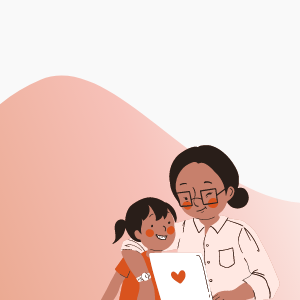How to Be a Role Model for Our Kids (When We’re Tired and Tapped Out)
written by Liza Bennigson, Associate Director of Marketing and Communications

Some days, just getting out of bed and making a cup of coffee can feel like an accomplishment. It’s all we can do to get the kids logged on to their class Zoom calls and ourselves to our first meeting on time. Bonus points for getting dressed (from the waist up), and if the whole family’s teeth are brushed? Well, it’s hard to hold back a fist pump.
And then it hits us, like the first, sharp jolt of an earthquake. It may come out of nowhere or be triggered by a news alert or the smell of smoke. The reminder that things are still not OK.
Even on the rare days when we are nailing our daily pandemic routine, we can’t ignore the fact that the world feels like it’s at its breaking point. From racism and climate change to a global pandemic and political unrest, a friend put it best: “Can’t we just have one existential crisis at a time?”
On top of making sure our own families are healthy and safe (and happy and nourished and bathed and educated and loved), we worry about friends, relatives and even total strangers who may be struggling. This persistent empathy is exhausting and our “surge capacity,” as Ann Masten, PhD, a psychologist and professor of child development at University of Minnesota calls it, is depleted. Yet we feel a deep desire and responsibility to help others–– because there is so much need, because we care and because want to set a good example for our children.
So the question becomes, how can busy, exasperated parents contribute to a more sustainable, equitable and compassionate community, and set a positive example for their kids to be a force for good in the world?
Change Starts at Home
As it turns out, change can start today, right at home. (Good news, since we’re spending a lot of time there these days, and these sweatpants are very comfortable).
 “Discuss the issues,” says Sand Hill School middle school teacher, Valerie Stephens, who has over 25 years of experience teaching students with a wide range of learning differences and abilities. “By talking about equality with your child and what work still needs to be done to reach an equitable world, you’re preparing them to help lead the way for a better future for everyone.”By first becoming aware of our own unconscious biases, we can authentically teach our children to challenge the stereotypes we encounter everyday. “Let your child know that you are a safe space for them to express themselves and encourage a culture of acceptance,” says Stephens. And then go a step further by empowering your child to speak out. We can all do more when it comes to educating ourselves and advocating for equal rights. But how?
“Discuss the issues,” says Sand Hill School middle school teacher, Valerie Stephens, who has over 25 years of experience teaching students with a wide range of learning differences and abilities. “By talking about equality with your child and what work still needs to be done to reach an equitable world, you’re preparing them to help lead the way for a better future for everyone.”By first becoming aware of our own unconscious biases, we can authentically teach our children to challenge the stereotypes we encounter everyday. “Let your child know that you are a safe space for them to express themselves and encourage a culture of acceptance,” says Stephens. And then go a step further by empowering your child to speak out. We can all do more when it comes to educating ourselves and advocating for equal rights. But how?
Promoting Equity and Compassion
CHC Clinical Program Manager, Karen Moos, LCSW shares her top 5 ways to promote equity and compassion in kids:
- Read books written by and about black, indigenous and people of color (BIPOC)—both yourself and with your children. Talk to your kids openly about privilege, equity, oppression and justice.
- Watch movies that star BIPOC in positive roles and/or informative documentaries about our countries history with racial (and other) injustices.
- Create theme nights by introducing foods and music from different cultures.
- Let your kids see you/be involved in showing compassion towards others (donate to a food or clothing drive; make supportive signs for front-line heroes and causes you care about; reach out to elderly neighbors, etc.)
- Encourage your children to donate some of their allowance to a charity of their choice. Share your own philanthropic priorities while letting them research and feel invested in their selected charity’s mission.
The important through line here is that none of these are passive “do as I say” strategies. We need to go further than simply role-modeling, and actively involve both ourselves and our children in these efforts. “We cannot afford to sit back and hope that our behaviors alone are sufficiently vigorous,” says Vidya Krishnan, MD, Head of Adolescent Mental Health Services at CHC. Dr. Krishnan suggests remarking upon and discussing what you see, hear and experience in the world, framing it within the context of the values you wish to imbue around race, sexuality, gender, ethnicity, environment, etc. “These do not need to be formal, fireside chats but rather quick water-cooler conversations had in the car or on the fly. Encourage problem solving with your kids and identify actionable items that you can do together to instill a sense of hope for the future. For both of you.”
Small Actions Can Have a Big Impact
 With so much uncertainty, inequity and unrest in the world right now, there is no shortage of opportunities to talk about empathy and compassion with your kids. Don’t avoid the hard conversations. If you walk past a homeless person or you’ve been laid off from work or a black person is being treated unfairly or there’s ash from local fires on your car, explain why in an age-appropriate way. Then, as Mr. Rogers said, “look for the helpers.” And talk about how your family can help, too.
With so much uncertainty, inequity and unrest in the world right now, there is no shortage of opportunities to talk about empathy and compassion with your kids. Don’t avoid the hard conversations. If you walk past a homeless person or you’ve been laid off from work or a black person is being treated unfairly or there’s ash from local fires on your car, explain why in an age-appropriate way. Then, as Mr. Rogers said, “look for the helpers.” And talk about how your family can help, too.
If the sheer idea of being a “helper” seems unrealistic and exhausting when you barely have the energy to boil water for mac n’ cheese, remember that your actions need not be big to have an impact. “Something as simple as painting a rock with an inspiring word and placing it on a walk around the neighborhood can offer brightness and positivity to your community,” says Lifon Huynh-Leresche, MEd, teacher at Sand Hill School. She also suggests listening to gratitude TED talks to put things in perspective, lift our spirits and remind us of all we have to be thankful for.
(Even if it is those sweatpants.)
Do you need someone to talk to? CHC can help. We invite you to call or email our Care Managers at 650.688.3625 or careteam@chconline.org to set up a free 30-minute consultation. CHC teletherapy services are available now.





